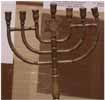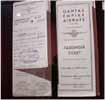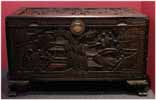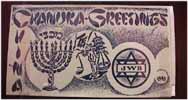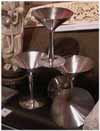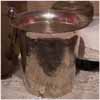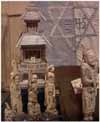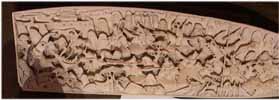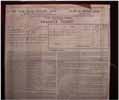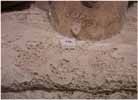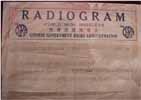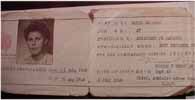|
October 2001 - August 2002 |
 |
|
|
| SHANGHAI
December 1945 On the 17th July the United States Air Force accidentally bombs Hongkew killing 31 and injuring an estimated 250 refugees. Japan surrenders in August after the bombing of Hiroshima. The Pacific War ends and the Japanese leave Shanghai. American troops arrive opening the way for the Nationalist Chinese Government to claim the city. Many Jews find work with the Americans who temporarily fill the commercial void. Shanghai is awash with US dollars. Teenage guides show Yankee soldiers around the seedier sides of town, while many local girls fall for them. Interned Sephardis recover their confiscated properties and businesses and re-establish their communal institutions. Predominantly pro-British, they are now forced to choose in the Zionist struggle against Britain for a Jewish homeland in Palestine. Russian Jews confront a dilemma – accept Stalin’s invitation to be part of Soviet reconstruction, face an unpredictable future in Shanghai, head for Palestine, or seek to emigrate elsewhere. The Nationalist seizure of Shanghai marks a period of corruption, extortion and violence. In his first anti-foreign act, President Chiang Kai Shek announces in November that stateless Jewish refugees (predominately German and Austrian) are to be expelled. Most refuse repatriation. |
|
Exit Shanghai “The Jews of Shanghai are all pimps, prostitutes
and black marketeers.”
Civil war engulfed China and Communist victory looked certain, making the future uncertain for all non-Chinese. They needed to find a new home. Jewish refugees were unwelcome nearly everywhere. With few countries willing to take them, and the doors to Palestine closed by Britain, the most promising destinations were North America, South America and Australia. The first major exodus of Jewish refugees to Australia was in 1946-7. Australian officials halted this flow in mid-1947 when a secret report by the Australian Consul-General in Shanghai, Colonel Fuhrman, labelled the Jews as people with “pasts unknown and unspeakable, their intentions obscure”. Russian Jews were also labelled as politically suspect. Many remained in Shanghai for at least a decade after the War and by 1957 there were still about 100 left, the last departing in the 1960s. Sephardi Jews with British passports had no trouble finding refuge, and entered Australia without problems. Ten thousand Jews left for Israel with the creation of the Jewish state in 1948. About 2,500 Shanghai Jews came to Australia and hundreds more from Harbin and Tientsin. |
| Object:
Lender: Date: Notes: |
Menorah
of Fang Bang Lu A Jakubowicz c1900s Brass From Shanghai |
|
| Object:
Lender: Notes: |
Airline
tickets to Australia Kohn, L Paper |
|
| Object: Lender: Notes: |
Camphor
wood chest Jakubowicz, A Wood |
|
| Object: Lender: Notes: |
Camphor wood chest Moalem, D Wood |
No image available
|
|
Object:
Lender: |
Chanuka greetings card with US banknote
inside Middleton, R Paper |
|
| Object: Lender: Notes: |
Cigarette cases Doff, Ron & Yvonne Silver Owned by Vera Doff; with Chinese scenes |
|
| Object: Lender: Notes: |
Condiment dish Doff, Ron & Yvonne Silver Owned by Vera Doff; Chinese designs and flowers |
No image available
|
| Object: Lender: Notes: |
Goblets Doff, Ron & Yvonne Silver Owned by Vera Doff; designs on side |
|
| Object: Lender: Notes: |
Ice bucket Oystragh, P Silver With dragon design |
|
| Object: Lender: Notes: |
Ivory ornaments Jakubowicz, A Ivory |
|
| Object: Lender: Notes: |
Ivory ornament John Roth Ivory |
|
| Object: Lender: Notes: |
Linen piece Marischel, S Linen Star of David; her mother-in-law made it from pieces of material and embroidered it in 1945 |
|
| Object: Lender: Date: Notes: |
Napkin Rivkin, H c1940 Linen Handmade in China |
No image
available
|
| Object: Lender: Date: Notes: |
Napkin Rivkin, H c1940 Linen Handmade in China |
No image
available
|
| Object: Lender: Date: Notes: |
Passage ticket Pisk, G 1947 Paper For passage on ship to Brisbane, arrived 19/8/1947 |
|
| Object: Lender: Date: Notes: |
Table cloth Rivkin, H c1940 Linen Handmade, Venetian linen from Shanghai |
|
| Object: Lender: Date: Notes: |
Telegram about family survivors in Europe
Pisk, G 1945 Paper |
|
| Object: Lender:: Notes: |
Trunk 2 Gunsberger, F & R Metal 'S GUNSBERGER SIDNEY'; from Vienna travelled to Berlin, Warsaw, Shanghai and Sydney |
|
| Object: Lender: Notes: |
UNRRA blanket Gunsberger, F & R Wool Provided to Rose by United Nations Relief & Rehabilitation Authority; after the war |
No image
available
|
| Object:
Lender: |
US Force China Theater, ID card, Susi Schranz
Pryer, C 1946 Paper |
|
|
|
|
|
|
|
|
|
